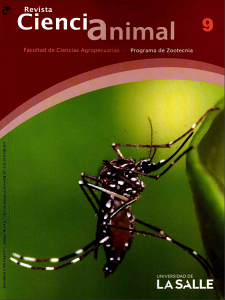Abstract
Soil fertility is one of the factors that significantly affect forage quality. In the savannah of Bogotá, physicochemical properties of a plot were conditioned to evaluate the agronomic performance, biomass production, protein and fiber content, dry matter digestibility, and tannin content of Lotus corniculatus. In a complete random arrangement, three treatments with different soil conditioners (without conditioning, sand, and a bio-fertilizer) were evaluated. It was found that soil conditions significantly affect biomass production, protein concentration, neutral and acid detergent fiber content, and the production of condensed tannins and protein-precipitating tannins in L. corniculatus. In addition, a negative association was found between ammoniacal nitrogen (N-NH4+) and pH with the concentration of protein-precipitating tannins, whereas the nitrate nitrogen (N-NO3-) did not affect the tannins content found. A negative association was evidenced between cation exchange capacity and the content of condensed tannins. The results show the importance of physical and chemical soil conditions to produce forage of L. corniculatus in high quantity and quality.Downloads
Download data is not yet available.



